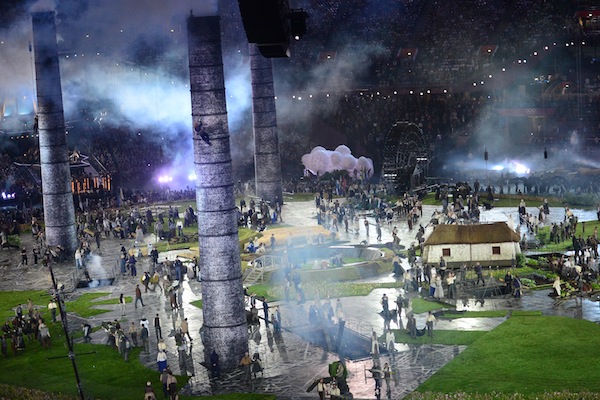Back from holiday and it seems just about the only “controversy” at these splendid* Olympic Games lies in Danny Boyle’s exhuberant opening ceremony. According to its critics it was multi-cultural crap or pap or something. And, of course, in one sense it was a hymn to multi-cultural Britain. Why else would Boyle have begun with choirs in Northern Ireland, Scotland, Wales and England (spliced with rugby footage) if not to remind the audience (in London and further afield) that the United Kingdom is not quite the same thing as England.
Of course, that’s not what the critics of multi-culturalism really mean when they sneer at “multi-culti” tripe and political correctness “gone mad”. One of the problems with discussing these matters is the difficulty of defining and agreeing on terms. If your understanding of multi-culturalism is that its proponents believe in some kind of parity of esteem between all cultures and all cultural “practices” in Britain (which leads to a revolting tolerance of intolerable matters such as forced marriages and the like) then your having one discussion. If, on the other, you seem to mean that multi-culturalism really means “too many black people and too many brown people as well” then you’re having quite another discussion.
I can’t help but feel that when discussing these Olympics “multi-cultural” most often means “multi-coloured”. So when Evan Davis asks Boris Johnson on the Today programme if Tories can be comfortable with a games that are “a really fantastic advert for multicultural, multiethnic Britain” he’s essentially asking Boris to agree that conservatives are, deep down, a bunch of racists.
Davis, however, seems confused by his terms too. There is, he suggests, a distinction to be made between “multiethnic” and “multicultural” Britain. Indeed there is but the story and tone of these Olympics – set by the opening ceremony – is of people from many parts, of many ethnicities and with many stories, coming together to represent a single place. E pluribus unum. Multi-ethnic yes but not multi-cultural in the way Davis seems to mean.
If you think of the United Kingdom as a kind of rope then you may begin to appreciate this more keenly. It contains many strands – mini-ropes themselves, if you like – but these combine to create a thicker, stronger, more enduring line.
And Danny Boyle’s Opening Ceremony demonstrated that too. Far from suggesting – as the triter critics have averred – that British history began with the arrival of the Windrush he told a story of British exceptionalism from the industrial revolution to the world-wide-web. If this was necessarily selective it was also surprisingly coherent (and Unionist in its DNA, incidentally). For that matter, it was also a story of the great shift from the land to the city in which Britain also took the lead, followed, in time, by almost every other country on the planet.
(Those complaining there was too much pop music -and the CND sign, incidentally, was a pop-cultural marker, not a political protest – and not enough poetry forget that, with a worldwide audience, the ceremony had to be a visual and aural feast.)
Perhaps Boyle flattered us too grandly. But this was the image of Britain that we like to pride ourselves upon: a trading nation open to the world, a tolerant place in which people of many hues and beliefs can find a home and build a better future. As stories go, this is a good one. It doesn’t belong to either left or right and it’s a foolish person who believes their particular political tradition has some kind of monopoly on goodness or is the sole inheritor of or guarantor of British exceptionalism.
Indeed, Boyle made that pretty clear in his programme notes:
We hope too, that through all the noise and excitement you’ll glimpse a single golden thread of purpose – the idea of Jerusalem – of the better world, the world of real freedom and true equality, a world that can be built through the prosperity of industry, through the caring nation that built the welfare state, through the joyous energy of popular culture, through the dream of universal communication. A belief that we can build Jerusalem. And that it will be for everyone.
That’s neither a conservative nor socialist vision, it’s a statement of muscular liberalism. Britain once led the world in that too, you know.
I suspect that’s why Shami Chakrabati – director of the civil liberties pressure group Liberty – was one of those charged with carrying the Olympic flag. How many other countries would afford such a notable honour to a representative of an organisation that, more often than not, exists to make life awkward for government? One in the eye for the Chinese, that.
So, yes, these games have been a splendid success. After all the chuntering and moaning beforehand (another great British tradition) it should not, really, be a surprise that many folk appear to be enjoying themselves rather more than they thought they would. That’s a typically British reaction too, of course.
Danny Boyle refashioned Our Island Story for the digital age and he did so in ways that were surprisingly thrilling and even, at times, moving. Audaciously, he suggested that the British idea was the Olympic idea too (and, of course, Jacques Rogge made the point that it is impossible to imagine the Olympics without this country’s dominant contribution to sport).
So if this is multi-cultural Britain on stilts then, by gum, given the success of these games then lets have more of this kind of thing. In a dreary moment in time, these Olympics have shone and offered comfort and cheer to all who have enjoyed them. That’s worth celebrating. And so is the idea of Britain we’ve seen and wondered at this month.







Comments